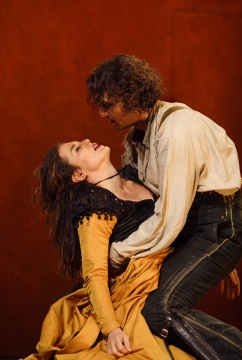|
|
|
|
|
|
|
|
| The Independent, 17 December
2006 |
| By Anna Picard |
Bizét: Carmen, Royal Opera House, London, December 2006
|
Carmen, Royal Opera House
|
|
 Designed by Tanya McCallin, Francesca Zambello's
handsome production of Carmen has been built to last. Those who thrilled to
her Royal Albert Hall production of La Bohčme will recognise the populous
backdrop. Pick-pockets and priests collide in the sun-baked square between
the barracks and the cigarette factory. There are tight-buttocked matadors
in sparkly suits, acrobats, altar boys, urchins, beggars, and a water trough
where broad-backed slatterns lazily sponge their dusty décolletages. There's
an orange tree (fake), a horse (real), and a chicken (also real). There's
even a donkey, Pollyanne, who comports herself with unfailing dignity. Designed by Tanya McCallin, Francesca Zambello's
handsome production of Carmen has been built to last. Those who thrilled to
her Royal Albert Hall production of La Bohčme will recognise the populous
backdrop. Pick-pockets and priests collide in the sun-baked square between
the barracks and the cigarette factory. There are tight-buttocked matadors
in sparkly suits, acrobats, altar boys, urchins, beggars, and a water trough
where broad-backed slatterns lazily sponge their dusty décolletages. There's
an orange tree (fake), a horse (real), and a chicken (also real). There's
even a donkey, Pollyanne, who comports herself with unfailing dignity.
As an exercise in forward-planning, you can't fault Carmen. Just think of
the 10th or 11th revival. The abseiling in Act III should make the dimmest
of Don Josés seem like James Bond, while entering on a horse will lend the
tiniest Escamillo a towering presence, albeit briefly. But the balance
between spectacle and intimacy is less secure here than it was in La Bohčme,
and the current leads have no such shortcomings. For all the pizzazz of
Zambello's painterly Seville, I found myself longing to see Anna Caterina
Antonacci (Carmen) and Jonas Kaufmann (Don José) on a smaller, darker stage,
with nothing to distract from their passion for each other, or from Antonio
Pappano's visceral account of the score. Instead, two productions unfold in
parallel: one a lavish tribute to grand opera, the other an intimate danse
sauvage.
Looks aside, neither Antonacci nor Kaufmann are obvious casting. Her
speciality is Monteverdi, his is lieder. I could happily devote a paragraph
to the beauty of her collar-bone or the curve of his jaw, but the impact of
their artistry is more profound. With naturally light voices, both are
forced to concentrate on the text, to shape their phrases as artfully as
they can, and to make Carmen and Don José more than a stabbable vamp and a
slappable wimp. This has little to do with traditional great singing, and
everything to do with the direct communication and frank emotionalism of the
great cabaret chanteurs and chanteuses. As Kaufmann conveys the increasingly
sharp disconnect between the dutiful mother's boy and the man who left
Navarra with a murder record, and Antonacci dissects the vulnerabilities
behind Carmen's casual cynicism, the Habanera, Seguidilla and Flower Song
are newly poignant, supple and sensual.
In the pit too, Pappano has reinvented this hackneyed work. Vicious tempi
and delicately sculpted phrasing are a daring and demanding combination and
the result is often shockingly sexual. Unfortunately this dynamism is not
unanimously reflected in the supporting cast. Norah Amsellem's shrill,
scatter-brained Michaela is comprehensively outclassed by Elena
Xanthoudakis's brilliant Frasquita, while Ildebrando D'Archangelo's stiff
Escamillo is clearly compromised by hippophobia. Jacques Imbrailo's easy
Morales is a rare treat among the wooden soldiers, while Jean-Paul
Fouchécourt's Le Remendado is a useful reminder of how the French language
can captivate and beguile. Somewhat guiltily, I realise that I invariably
favour less overtly glamorous productions. But for the complexity and
honesty of what happens between Antonacci and Kaufmann, and the blistering
energy and intelligence of Pappanpo's conducting, I'll take as many urchins
and acrobats as you care to throw at me. |
|
|
|
|
|
|